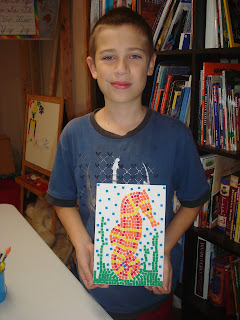Recently we spent two weeks learning about Ancient Greece. Not the classical period of Ancient Greece, but before that... during the time of the Trojan War, Odysseus and his odyssey, Jason and his golden fleece. We learned about the beginnings of the greek myths of gods and goddesses, which were well formed by the time the classical period of Greece began. Our middle schoolers read abridged versions of both the Iliad and the Odyssey. It was very fascinating and we all enjoyed it very much!
At the end of our first week learning about Ancient Greece, we enjoyed Greek food while watching the movie: The Odyssey (made for tv version starring Armand Asanti ~ we ended up watching over a couple nights because it's nearly 3 hours long, and fyi if you ever watch it with children, we had to skip over a few suggestive parts, so you definitely need to preview). Our dinner consisted of Greek style lamb and rice, with hummus and bread on the side. You can find the recipe here on my cooking blog. It was absolutely delicious!!


We also did a couple really fun crafts. The first was painting Greek pots. Pottery was not only functional but also became an exquisite art form. Scenes of daily life were often painted on pottery, which is one way we know so much about the Ancient Greeks today. And different areas had slightly different processes for making pottery, so when archaeologists find pots in one area that they know were made elsewhere, it gives them insight into trade routes, trading partners, and types of things traded (depending on the type of pot).
So to begin this project we first looked at pictures of pottery in our history books.

Each child was given a small clay flower pot and sketched their picture on it. Then they painted!




Little Man decided to add handles to his pot. Didn't they turn out wonderfully?



The second project we did was make mosaics. Below is what the boys used. We chose the "under the sea" mosaic kit since the Greeks were surrounded by water. Beautiful mosaics have been found in Greek ruins, and it was they who introduced this art form to the Romans. The Romans took this idea and perfected it, making amazing mosaics that look like photographs!
 If you have a child who is focused enough to sit for an hour or more doing one activity if it really interests them, and you need to keep them busy while you work on a project of some kind, I highly recommend these peel and stick mosaics! The picture is already "painted" on, and each square is numbered so the child knows what color of sticky backed foam to place on it. It's not hard, just a bit tedious. However, my boys were so enthralled with this activity, they happily worked for nearly two hours on their masterpieces! (yes, even Little Man!)
If you have a child who is focused enough to sit for an hour or more doing one activity if it really interests them, and you need to keep them busy while you work on a project of some kind, I highly recommend these peel and stick mosaics! The picture is already "painted" on, and each square is numbered so the child knows what color of sticky backed foam to place on it. It's not hard, just a bit tedious. However, my boys were so enthralled with this activity, they happily worked for nearly two hours on their masterpieces! (yes, even Little Man!)






Daughter G did a different type of mosaic, and this was more involved and took more time.

She sketched her picture and taped it to her desk under a lamination sheet, sticky side up. Then she placed colored squares of paper on the lamination sheet. Many of them were not small enough so she had to cut them down to the right size.

Didn't it turn out beautifully?

All of the children had fun and did a great job!

Now when we come to the classical period of Ancient Greece we will have lots of mental "hooks" on which to hang new information!
Very nice! I remember the mosiacs were a favorite activity when we did them. I still have a bag full of tiny half inch construction paper squares that I made. We'll be using them again for the littles. I think the bigger two would love to do what DD G did. I'll have to get some specifics from you. Blessings.
ReplyDeleteThis comment has been removed by the author.
ReplyDeleteThank you for sharing your Ancient Greece craft ideas! This was very helpful to me, since I am working on planning/directing a VBS based in Greece, during the time of the Apostle Paul! I want to have everything - including the crafts and food - to be as "authentic" as possible!
ReplyDelete